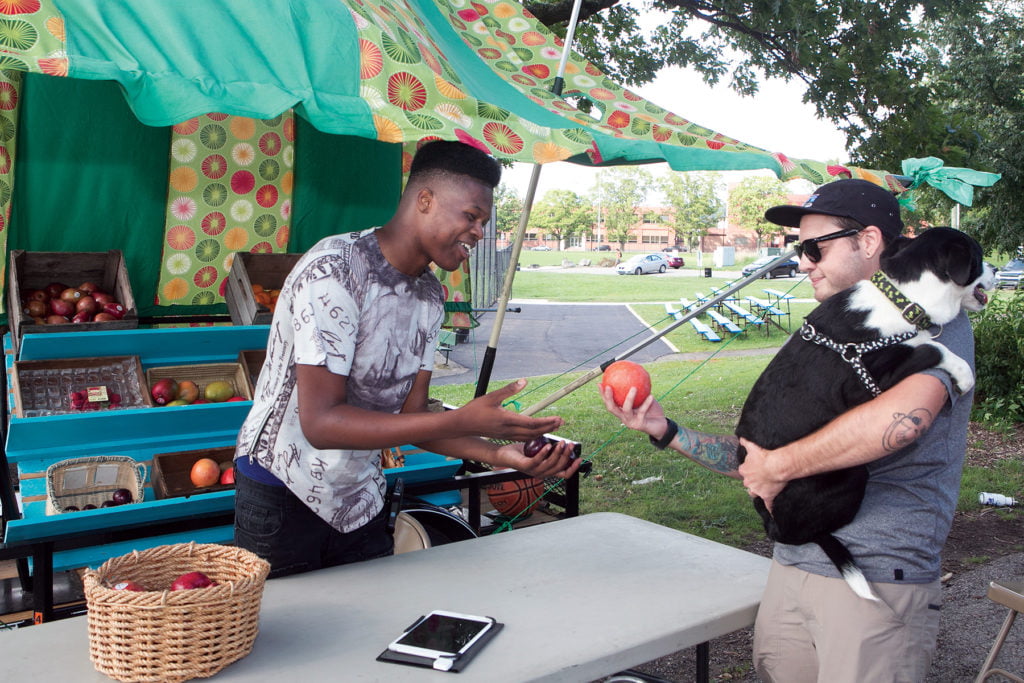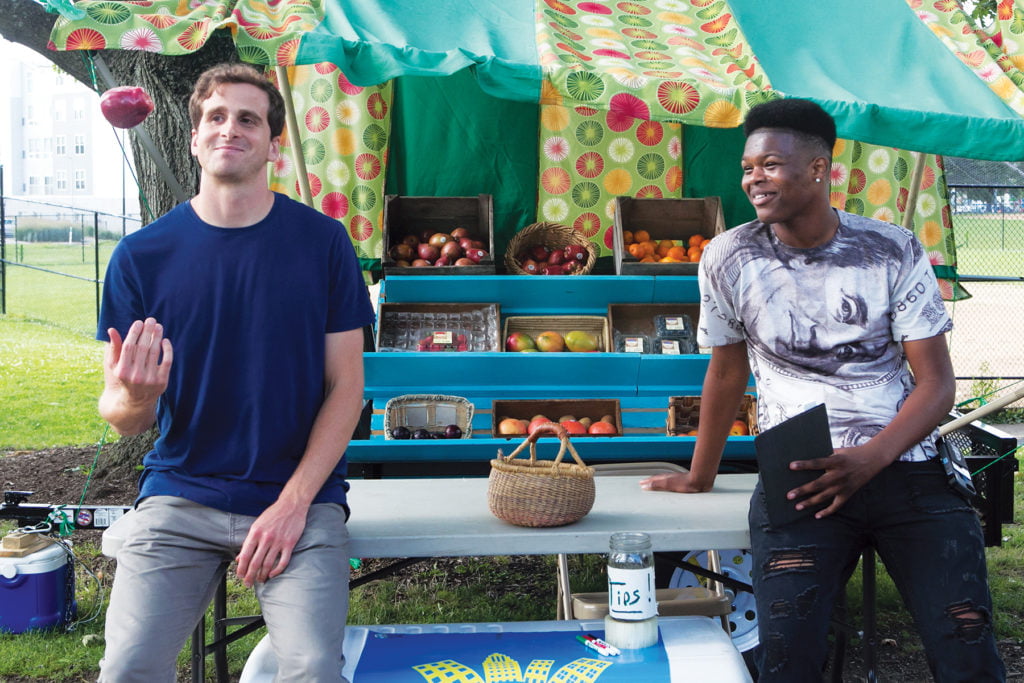East End Fruit Cart brings fresh food to underserved neighbors
Story by Andrew McKeon, the Bulletin

ABOVE: At the East End Fruit Cart in Mellon Park, Jamel Haden (left) helps customers like Lando DePaulo – and his dog Lemmy – find the right fruit on a breezy July day. Haden and his two teenage co-workers use the mobile cart to bring fresh fruit to underserved neighborhoods throughout the city’s East End. Follow the East End Fruit Cart story below. Photo by John Colombo.
East End – Last year, when Tim Lydon returned to his hometown of Pittsburgh after spending many moons living and working on farms out West, he could tell the city had serious issues with food. Not the kind of food issues we often hear about (i.e. “Breaking News: Pittsburgh loves pierogies”), but the kind that many local residents seldom even notice (i.e. food scarcity in underserved neighborhoods).
“I’m really interested in issues of food scarcity and availability here in Pittsburgh. In the East End, there are plenty of places where people have no access to fresh fruits and vegetables.”
Drawing on his understanding of the politics of food, Lydon decided that he could really make an impact by simply bringing fresh food to the people, in their neighborhoods.
So, he created the East End Fruit Cart, a mobile fruit stand that he tows all over the city’s East End. Alongside three teenagers who run the fruit sales, Lydon posts up at a different public venue every day – from Monday through Saturday – to engage in a new kind of community outreach.
Created by a local artist, the cart and its cantilevered drapes are fairly impressive. But, the cart itself – and even the fruit – is only part of the story. What is most impressive is the intentional commerce that is at the heart of the project. On July 24, the Bulletin visited the fruit cart under Mellon Park’s canopy shade, near the intersection of Fifth and Penn Aves.
“We’re in Homewood and we’re in Larimer, both places that have traditionally been considered ‘food deserts,’” Lydon explained. “We’re also in Oakland, which people might not think of as a food desert. Outside of the farmers markets, there’s nowhere to buy produce in Oakland.”
In response to a question from intrepid Bulletin photographer John Colombo (“Why don’t you take the cart to local farmers markets?”), Lydon replied that he did not want to cut into any other vendor’s profits. Since the fruit cart sources its goods from local grocery stores, he said, it would be unfair to vend at farmers markets, where most vendors sell their own farm-sourced products to make a living.
When looking for funding, he sought counsel from the BGC’s Rick Flanagan, Youth Development Director, and Rick Swartz, Executive Director. Lydon was eventually able to secure “Community Development Block Grant” monies, along with some fruit donations from Trader Joe’s and a cooler from the East End Food Co-Op.
“We just got $1,000 from Eat n’ Park yesterday,” he said. “Then, there is Bridgeway Capital, which is a nonprofit lending institution that has a department devoted to issues of food scarcity. We’re meeting with them next week.”

ABOVE: Tim Lydon (left) and Jamel Haden juggle fruit and responsibilities at the East End Fruit Cart in Mellon Park. Bringing fresh fruit to underserved neighborhoods, the fruit cart project seeks to address local issues of food scarcity. Photo by John Colombo.
With the grant money on its way, the project vision called for a six-week timeline. Since Lydon could not wait any longer, he took it upon himself to kick-start the fruit cart funding.
“Most of the money still hasn’t come through yet, but I knew this project had to start on June 26. So, I just bought everything on my own credit cards,” he said with a pause. “You could say I’m pretty committed to it.”
Local teenager Jamel Haden, a former Learn & Earn program participant and current BGC employee, works with Lydon to gather data on all the fruit sales. He even learned something about his own palette. “I’d never eaten Kiwi before, but I like it now,” Haden revealed. “I thought it was bitter until I first tried it.”
He asks customers what they think about things like a “fair price” for plums (the cart’s best-seller), then enters that information into a tablet, using Square technology to track spending patterns and what fruit sells best at each location.
“One thing we’ve found is that there has to be an educational component, because people need to know how to prepare fruits and vegetables,” Lydon said. “We need to team up with someone who can teach others how to make healthier choices.”
As part of the project’s social element, Haden and his teenage coworkers at the East End Fruit Cart sat down with representatives from 1Hood, a social justice organization that uses art to raise awareness and mentor young Pittsburghers.
“[1Hood founder] Jasiri X made a real impression on the kids,” Lydon said. “One of them has already applied for an internship [at 1Hood]. You know, it’s important for the kids to meet community leaders who look like them.”
The project’s ultimate goal is to form inroads with local residents and build a network of community supported agriculture (CSA). Lydon believes this idea could create more of a laser-sharp focus on bringing food to neighborhoods that do not have access to fresh foods
“We could identify a neighborhood – for example, Homewood or Lincoln-Lemington or Larimer – and then find kids from that neighborhood to be neighborhood ambassadors,” he explained. “They’d literally be going door-to-door to ask their neighbors if they want to order fresh fruits and vegetables. So, it would be like a CSA program run by kids in each neighborhood.”
Learn more about the cart and its mobile mission to bring fresh food to East Enders at www.eastendfruitcart.com.
Click here for more stories from the August issue of the Bulletin (Vol. 42, No. 8)


Leave A Comment